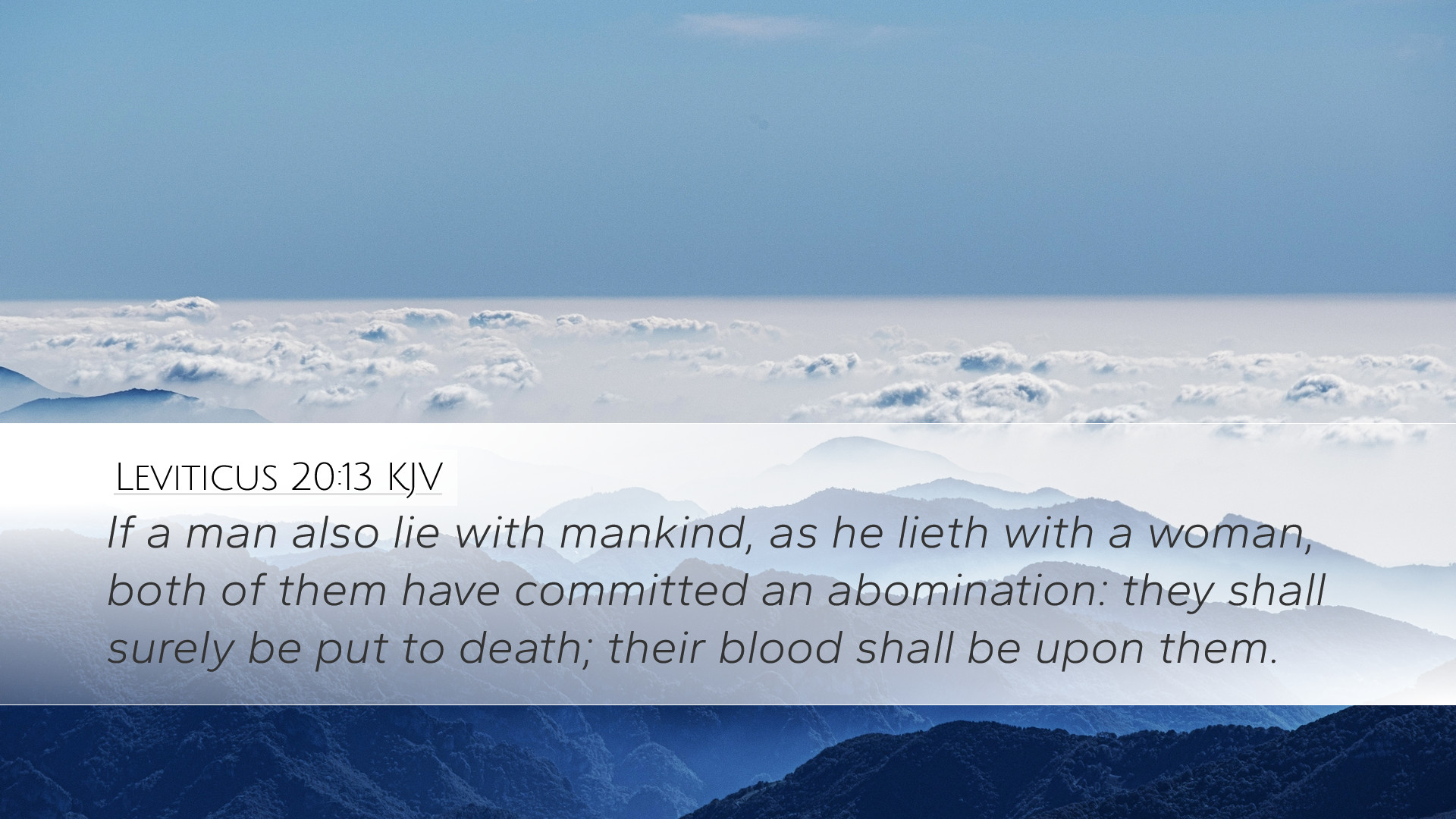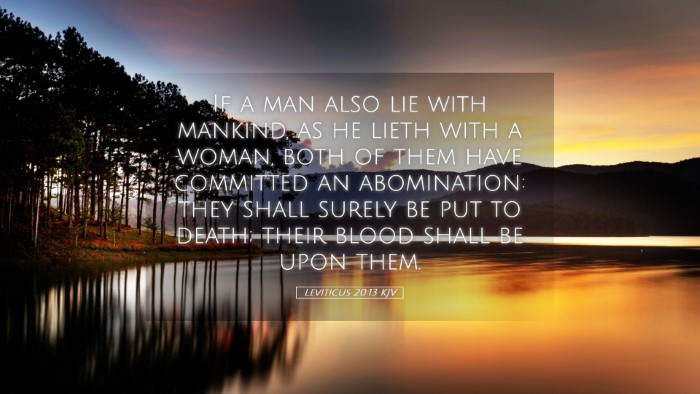Commentary on Leviticus 20:13
Verse Reference: Leviticus 20:13 - "If a man has sexual relations with a man as one does with a woman, both of them have done what is detestable. They are to be put to death; their blood will be on their own heads."
Introduction
The verse from Leviticus 20:13 represents one of the most debated passages in Scripture regarding sexual ethics. As part of the Holiness Code, it underscores the seriousness with which Israel was to treat sexual relationships outside of God's design. We shall explore insights from noted public domain commentaries to unpack its theological, historical, and ethical implications.
Historical Context
Leviticus was given to the Israelites during their wilderness wanderings, serving as a crucial document setting boundaries and calling God’s people to holiness. Notably, the laws contained within this book were aimed at distinguishing Israel from surrounding nations, particularly their sexual practices which often defied the moral order set by God.
Matthew Henry's Commentary
Matthew Henry highlights that Leviticus 20 is characterized by strict laws that reflect God's righteous anger towards immoral behavior. In his interpretation of verse 13, he explains that the prohibition against same-sex relations represents deeper dimensions of disorder and transgression against God’s creative order. Henry emphasizes that holiness is not merely abstaining from physical acts but involves the entirety of one's being aligning with God's will.
Albert Barnes' Notes
Albert Barnes provides additional insights into the social implications of this law. He indicates that the penalties prescribed for such acts were intended to maintain moral purity within the Israelite community. He posits that the severity of the punishment—the death penalty—reflects the gravity of the act in contrast to God's design for human sexuality, which is viewed as a sacred covenant primarily fulfilled within heterosexual marriage.
Adam Clarke's Commentary
Adam Clarke offers a theological perspective on this passage by discussing the nature of God's law. He interprets the severe consequences not only as legal repercussions but as divine judgment that reveals the holiness of God. Clarke accentuates the notion that while the Old Testament law served as a model for morality, it also poignantly points toward the necessity of grace through faith, particularly in light of New Testament revelations.
Theological Implications
In exploring Leviticus 20:13, it is essential for pastors and theologians to reflect upon the broader theological themes it conveys. This verse aligns with the overarching narrative of the Bible that underscores God’s desire for His people to pursue holiness.
Holiness and Separation
The call to holiness in Leviticus implies a separation from practices seen as abominable before God. The usage of the term "detestable" infers a divine revulsion towards acts that distort God’s created order. This reflects the nature of God’s holiness—a call to His people to reflect His character in their conduct.
Consequences of Sin
The penalty outlined is not just punitive but deeply relational. God desires that His people understand the implications of sin, both on an individual and communal level. The consequences serve as a dire warning about the spiritual ramifications of deviating from God’s design—encouraging believers to seek reconciliation and restoration through repentance.
Ethical Considerations
Leviticus 20:13 is often brought into contemporary discussions about sexual ethics within the church. Understanding its context is pivotal for constructing a biblically grounded approach to modern issues surrounding sexuality.
Understanding Contextual Ethics
While some may argue against the applicability of Old Testament laws in the New Covenant context, it is crucial to examine the underlying principles rather than merely the letter of the law. Ethical directives are rooted in the character of God, and while the ceremonial aspects may differ under the New Covenant, the moral implications remain relevant and must be addressed thoughtfully.
Engaging with Modern Culture
Pastors and theological educators are challenged to engage with contemporary culture with both grace and truth. While standing firm on biblical principles, it is vital to embody the love and redemptive power of Christ, providing a compassionate response to those who wrestle with sexual identity and orientation.
Conclusion
Leviticus 20:13 serves as a sobering reminder of God’s unchanging standards for morality and the profound call to holiness within the community of believers. Drawing from the insights of Matthew Henry, Albert Barnes, and Adam Clarke, we recognize the necessity for churches to uphold biblical truth while extending grace to all—mirroring the radical love articulated in the New Testament.
As we reflect on this verse, may we cultivate wisdom in navigating these discussions, equipping ourselves to lead with both conviction and compassion as we uphold the truth of God’s Word in today’s world.


